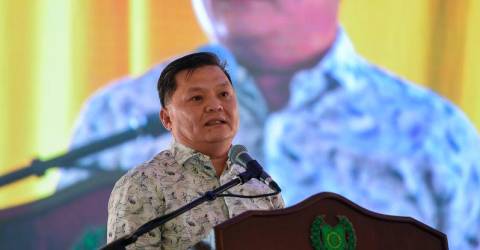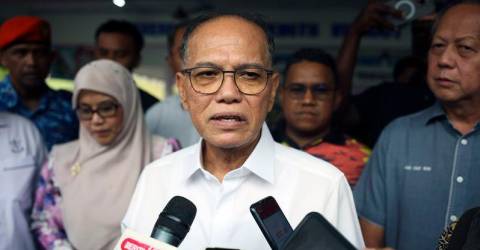ADVERTISE HERE

Dr Sim (fourth left) officially launches the 15th Malaysian Hospice Council Congress with other officials.
SIBU (July 26): Moving palliative care into a mainstream service is one of the main targets of the Sarawak government, said Deputy Premier Datuk Amar Dr Sim Kui Hian.
Speaking at the opening ceremony of the 15th Malaysian Hospice Council Congress (MHCC) here last night, he said the availability and accessibility of palliative care in Sarawak remains uneven with most concentrated in urban areas.
He said there is an urgent need to develop palliative care in Sarawak as the state is projected to need the highest palliative care in the country by 2030.
“In some parts of Sarawak, for example traveling from Sibu to Kuching is quite a distance away. Although the road is good, but it still takes considerable time and costs.
“In Sarawak, I am happy that a lot of non-governmental organisations (NGOs) are filling the gaps with the establishment of Domiciliary Palliative Care in 34 health clinics across the state in 2023,” he said.
Dr Sim cited initiatives to train master trainers in palliative care, with 13 health clinics participating in training sessions as part of collaboration with the Asia Pacific Hospice Palliative Care Network (APHN) to ensure sustainability.
“I really appreciate that even though we are in the jungles of Borneo, give us the opportunity and we will play our role to help palliative care growth in Sarawak and the rest of the world; that is our commitment,” he said.
He also highlighted ongoing collaboration between Sarawak and the American Society of Clinical Oncology (ASCO), featuring the online ASCO Palliative Care e-course since 2021 and other joint projects.
The Public Health, Housing and Local Government Minister said a major development this year is the public-private partnership between Kuching Life Care Society’s 58-bed inpatient hospice and the Sarawak General Hospital (SGH) Palliative Care Unit.
He said this will help ease congestion at the hospital’s Palliative Care Unit by expanding services to the NGO’s hospice in Batu Kawa, providing care at no cost to patients.
“The government of Sarawak is fully supporting the development of Palliative Care in Sarawak, and we will be proudly hosting the Asia Pacific Hospice Palliative Care Conference (APHC) in 2025 in Kuching,” he said.
However, he admitted there are ongoing challenges including geographical barriers, resource limitations, general lack of awareness and understanding about palliative care among the public and healthcare providers, and inadequate policy frameworks to integrate palliative care within the broader healthcare system.
“We will try our best to work with the community and ASCO and APHN so that together we can do something; never underestimate what we can do when we play our role together,” he said.

 1 year ago
73
1 year ago
73



 English (US) ·
English (US) ·